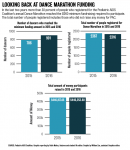This weekend, dancing comes with a price.
Besides the physical and emotional strength it takes to dance 26 hours straight, students must also raise $10 per every hour they dance, which equals to $260.
The Pediatric AIDS Coalition at UCLA, which organizes the annual Dance Marathon and advocates for HIV and AIDS research and education, said the money students fundraise will benefit organizations which help those who are affected by the disease.
Blake Davila, a PAC member and fourth-year economics student, said there are many ways for participants to fundraise the $260. Most often, students post on various channels, including Facebook, email and other social media platforms, about the cause they are raising donations for.
But others get creative.
“I’ve sold brownies – a couple batches that I made in a friend’s apartment,” said Maggie Scanlon, also a PAC member and a fourth-year human biology and society student. “That was in combination with talking to friends and family.”
Carolyn Francis, president of PAC and fourth-year architecture student, said she likes taking photos, so one year she pre-booked students for senior photos so that the money would go to her fundraising.
She added others have tried to help their kitchenless friends by renting out their apartment kitchens to them for events, and one friend even wrote songs for people who donated and posted the recordings on their Facebook profiles.
Others get imaginative by asking for donations in exchange for dyeing their hair, growing a beard or dancing in a morphsuit on Bruin Walk, said Carolyn Rocha, PAC’s fundraising director and fourth-year psychobiology student, in an email.
“The biggest thing to remember is to capitalize on your talents (when fundraising),” Francis said.
Francis added that PAC believes it is important for participants to know where to exactly the money they have raised is going.
There are four beneficiaries of Dance Marathon: 70 percent of the proceeds go to the Elizabeth Glaser Pediatrics AIDS Foundation, which works worldwide to promote education on AIDS and to help mothers have access to HIV testing sites so that they can prevent transmitting the virus to their children.
An additional 17 percent goes to Project Kindle, which is based in LA and provides opportunities for children infected or affected by HIV and AIDS to go to summer camp in Nebraska.
The UCLA AIDS Institute receives 12 percent to fund research, and PAC uses the last 1 percent to organize life skills retreats for those affected by the disease who are about to enter college or the workforce, Francis said.
Scanlon said that as a PAC member, she has seen the progress the fundraising has made on AIDS research and education has made over a the last few years. She added that participating in Dance Marathon makes her feel like she is part of something greater here on the UCLA campus.
“We like to say that (AIDS) was discovered here, so it’s going to end here too,” Francis said. “We’re going to find a cure.”
